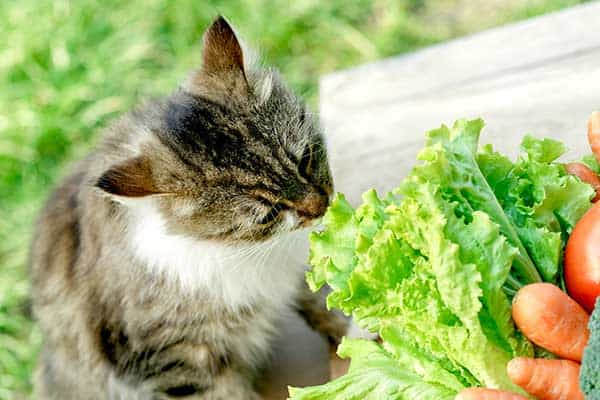Whichever part of the world you come from, it’s almost impossible to discuss salads without making reference to lettuce.
Lettuce is a preferable ingredient for salads due to its delectable taste and high dietary content. Some nutritionists even rank it as one of the superfoods.
If you own a cat, you may realize that your feline friend usually shows some interest in your lettuce salad. Now, most pet parents don’t mind offering their cats plant-based foods, arguing that after all, cats love to nibble on grass.
If you also belong to this school of thought, you’ll see no problem offering lettuce to your cat. And even if you don’t, your cat may still sneak up behind your back to help itself to the remaining lettuce.
And you could be wondering to yourself; my cat likes lettuce, can I freely allow it to snack on the vegetable? Indeed, it’s not unusual to find a lettuce-loving cat owner asking themselves, is lettuce safe for cats?
The short answer is yes, lettuce is perfectly safe for your feline friend. The vegetable is loaded with antioxidants, water, and dietary fiber that your cat can immensely benefit from.
In fact, lettuce ranks alongside broccoli, cabbage, spinach, and kale among the top vegetables that cats can eat. So, there are no immediate health concerns to worry about.
But as you shall find, moderation is the keyword when it comes to offering human foods to cats.
Read on as we dissect the topic of cats and lettuce. Among the points that we’ll highlight include the potential health benefits of lettuce as well as the precautions to take while feeding the vegetable to your kitto.
Table of Contents
What Should Cats Eat?
Does your cat need lettuce?
One of the ways to answer this question is first to examine what cats should eat. Cats are obligate carnivores, which means that they can survive purely on a diet of animal protein.
Now, it’s easy to argue that since cats were domesticated thousands of years ago, they may have lost some of their adaptations. Well, there’s some truth to that theory.
For instance, cats were meant to be crepuscular animals, which implies that they should be most active at dusk and dawn.
However, you may have observed that your feline friend sleeps the entire night and wakes up with you. That’s just one of the ways cats have tried to adapt to the routines of their human owners.
But when it comes to their dietary needs, things are still pretty much as they were in the wild. Your kitto can live its entire life eating flesh, and won’t miss vegetables one bit.
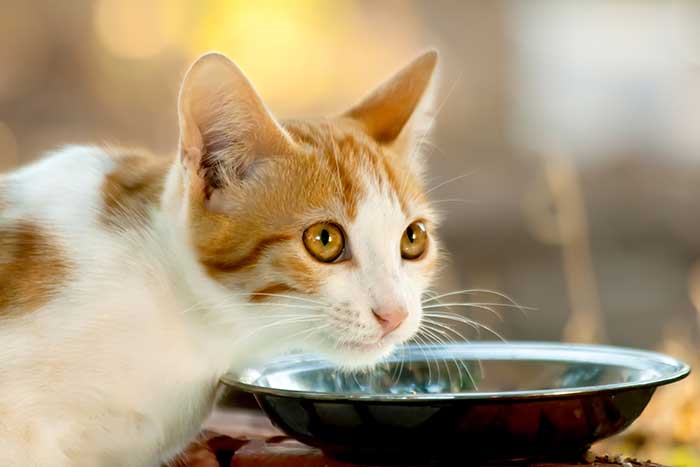
In fact, the bodies of cats are designed to synthesize some of the mineral elements, such as Vitamin C, that they cannot derive from their regular diet of animal protein. That only goes to show how plant-based foods might not benefit your cat in any way. So, is lettuce bad for cats?
Well, not quite. While cats don’t need plant-based foods to thrive, there’s absolutely nothing wrong with feeding them healthy vegetables once in a while.
If you’ve lived with cats for a reasonable duration, you must have observed that your feline friend loves to nibble on grass.
Cats tend to eat grass blades because grass contains digestive enzymes that promote efficient digestion. As with most plant matter, grass also relieves various digestive complications, including constipation and diarrhea. Plus, grass contains folic acid, which may be useful for pregnant cats.
You may also have realized that soon after your cat eats grass, it throws up. Some pet owners usually consider this a sign of an underlying medical condition. But that may not necessarily be the case.
Throwing up right after nibbling on grass may help to get rid of foreign substances in your cat’s stomach, such as furballs. Also known as hairballs, furballs are balls of hair that accumulate in the stomachs of furry animals that love to lick their coats.
- DIGESTIVE HEALTH: Help your cat achieve optimal indoor wellness and hairball relief with gentle fiber.
- INDOOR PET WELLNESS: Cat Grass provides a life-enriching, gentle & safe alternative to house plants.
- NUTRIENT-RICH CAT GRASS: Also great for dogs, birds, reptiles, rabbits, guinea pigs, gerbils and more!
Last update on 2025-03-12 / Affiliate links / Images from Amazon Product Advertising API
Evidently, grass appears to be a healthy treat for cats. However, it comes with numerous limitations. For instance, it can induce needless vomiting. Also, the grass may have been treated with hazardous pesticides that could present long-term health implications for your cat.
In light of the dangers involved, you might consider substituting grass with a healthy, tasty, and nutritious vegetable like lettuce. So, is lettuce okay for cats?
Yes, at least for pet parents that are looking for healthy plant-based foods to incorporate into their cat’s diets.
Different Types of Lettuce
Lettuce comes in various shapes and forms. And if you’re still wondering to yourself, is lettuce safe for a cat to eat, you’ll benefit a lot from learning of the many lettuce varieties out there.
First off, it’s important to note that there are scores of lettuce variants. But the most popular ones include Iceberg lettuce, Romaine lettuce, Leaf lettuce, and Butterhead lettuce. But how safe and healthy are they for your feline friend?
Can cats eat iceberg lettuce?
Iceberg lettuce are some of the most abundant types of lettuce, and are considered safe for cats.
Can cats eat romaine lettuce?
Romaine lettuce is darker and greener than most lettuce varieties. And you could be wondering, is romaine lettuce bad for cats?
Not at all. The darker and greener shade simply implies that romaine lettuce comes with an even higher nutritional profile. So, it could be safer and more beneficial for your kitto than most lettuce varieties.
Can cats eat butter lettuce?
As you may have guessed by now, the answer is a yes. The only difference between the many types of lettuce is their nutritional profiles. With regards to their safety for cats, there shouldn’t be any immediate concerns to worry about.
Can cats eat red leaf lettuce?
Yes, they can.
All lettuce varieties are safe and nutritious for cats as long as you offer the vegetable to your furry friend in moderation.
Are There Any Benefits of Lettuce to Cats?
We’ve continually emphasized how safe and nutritious lettuce is for cats. The following are some of the ways your cat can benefit from occasionally snacking on lettuce.
1. Dietary Fiber
This is arguably the greatest way your cat can benefit from snacking on lettuce. The vegetable is loaded with dietary fibers that perform three crucial roles in your cat’s body.
First, the fibers promote the growth of gut-friendly bacteria, thereby improving the activity of your cat’s digestive enzymes.
Also, the dietary fiber that’s present in lettuce helps with bulking of stool, which is useful in improving your cat’s bowel movements.
Lastly, dietary fibers are popular for their ability to create a sense of fullness and satiation. That means they make your cat feel fuller for longer.
As such, you can consider adding lettuce to your cat’s diet if you’re looking to reduce the quantity of foods that the cat eats. Which is useful in managing your cat’s weight.
And speaking of weight management, it’s also worth noting that lettuce is low in calorie, which makes it a perfect vegetable treat for obese cats.
- EASY TO USE, IMPACTFUL RESULTS: Collect a sample, package it up, and send it securely back. Just register, swab, return with the...
- MOST COMPREHENSIVE BREED & TRAIT: Our test distinguishes over 20+ distinct breeds and 50+ trait markers with the most...
- SCREEN FOR 40+ GENETIC DISEASES: Get peace of mind by screening for 64 health markers associated with 43 diseases for which your...
Last update on 2025-03-12 / Affiliate links / Images from Amazon Product Advertising API
2. Water Content
Lettuce is also loaded with water, which might be very helpful with relieving dehydration. Dehydration in cats is usually accompanied by a loss of appetite. Therefore, the cat eats and drinks less than it should.
One way to help a dehydrated cat is to offer it foods that are high in water content, such as lettuce. As the cat snacks on the food, it will be seamlessly taking in a substantial amount of water. That way, you won’t have to be too worried if your furry friend doesn’t drink after eating.
3. Prevention of Disease
Lettuce is rich in antioxidants, such as phenolic acids, anthocyanins, flavonoids, as well as Vitamins A and C.
These antioxidants work synergistically to boost your cat’s immunity. Together, they prevent the accumulation of free radicals in the cat’s body cells, which could result in oxidative stress.
Oxidative stress refers to a state of imbalance between the amount of free radicals and antioxidants in an organism’s body.
When the scale tips in the direction of free radicals, your cat could develop various chronic illnesses, such as cancer, diabetes, heart disease, and arthritis.
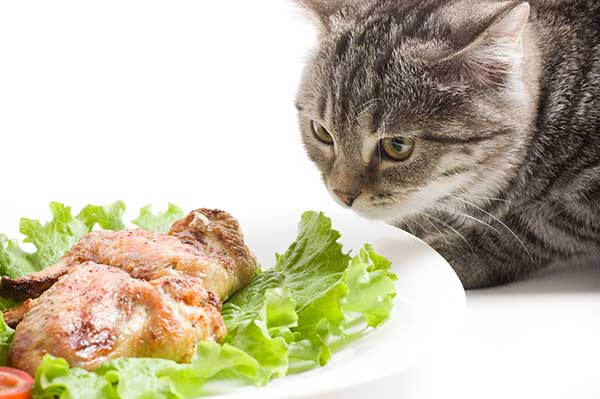
4. Takes Your Cat’s Interest from Other Plants
We already highlighted that cats have a penchant for nibbling on grass and other plants within your compound.
We also mentioned that there are benefits and dangers of allowing cats to freely eat grass blades.
The good news is that the benefits your cat derives from eating grass can also be obtained from snacking on the tastier and more nutritious lettuce.
By feeding your cat lettuce regularly, you’ll take its interest from grass and other plants in your backyard. Most importantly, the cat will not find a reason to destroy your indoor plants.
Overall, lettuce takes away the risks involved in having your cat nibble on other indoor and outdoor plants, which include choking and toxicity.
The following are other minerals and vitamins in lettuce, along with their corresponding benefits.
- Vitamin C – Boosts your cat’s immune system.
- Calcium – Improves the strength of your cat’s bones and teeth. It also supports nerve function, muscle function, and blood clotting.
- Vitamin K – Also plays a role in the prevention of bone fractures as well as the promotion of blood clotting.
- Vitamin A – Supports cell growth and helps promote eye health.
- Potassium – Reduces the accumulation of sodium in your cat’s body, thereby reducing your cat’s susceptibility to sodium ion poisoning. And in that regard, can cats with kidney disease eat lettuce?
Yes, diabetic cats and cats suffering from various kidney complications can benefit from the high potassium content in the vegetable. As we’ve mentioned, potassium helps to avert salt poisoning. - Folate – Helps in making genetic material, and is especially useful for pregnant cats.
- Manganese – Helps with the metabolism of carbohydrates and proteins. It also enhances the production of energy.
- Iron – Promotes the development and health of red blood cells.
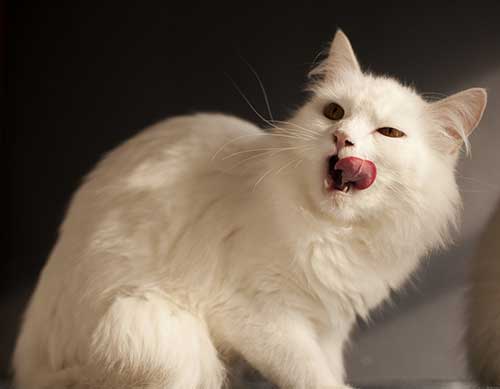
How to Feed Lettuce to Your Cat
Having reviewed all the potential health benefits of lettuce for cats, you could still be wondering, can lettuce hurt cats?
This takes us back to our keyword – moderation. As with any plant matter, lettuce should only be administered to cats as an occasional treat. The food should not replace your cat’s staple diet.
If you don’t monitor the amount of lettuce that you offer to your feline friend, the cat could suffer certain side effects.
Examples include gastrointestinal complications, such as vomiting and diarrhea, and allergic reactions.
While lettuce is rich in dietary fiber, the fiber contains laxative properties when consumed in large quantities. As a laxative, the fiber could lead to diarrhea and dehydration. So, can lettuce make cats sick?
Yes, especially if the cat eats more of the vegetable than it should.
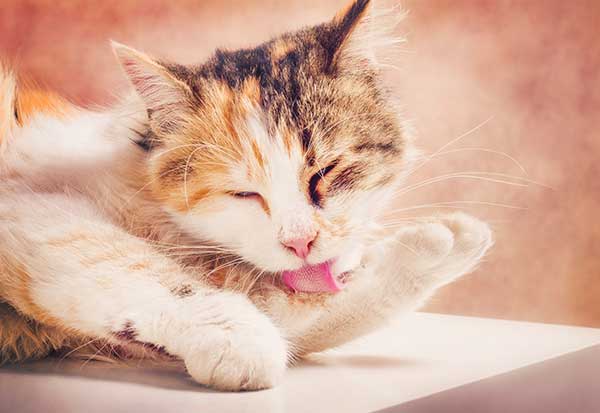
It’s also worth remembering that lettuce is still classified as plant matter. And since cats are obligate carnivores, their digestive systems consider all plant matter as foreign substances.
Feeding too much lettuce to your feline friend could cause choking or irritation to its digestive tract. And that begs the questions – what is the best way to feed lettuce to your cat and what kind of lettuce can cats eat?
Now, you can feed lettuce to your cat either raw or cooked, which helps settle the question, can cats eat raw lettuce?
However, whichever form of lettuce you offer to your cat, ensure you chop the vegetable into bite-size and chewable pieces.
Then, you can offer it to the cat as a standalone meal or mix the vegetable into the cat’s main food.
If you prefer cooked lettuce, boil or steam the vegetable in moderate heat to retain its primary nutritional elements. And when serving lettuce to your cat, avoid adding any spices or salt.
But does it mean any cat can eat lettuce provided you observe the above precautions?
For instance, can kittens eat lettuce? It’s important to note that the digestive system of your kitten may not be as robust as that of adult cats. So, avoid offering lettuce (or any plant-based foods) to kittens. Very old and sickly cats shouldn’t eat lettuce either.
So, Can Cats Eat Lettuce?
As a cat lover who frequently uses lettuce, you’ll occasionally find yourself wondering, why is my cat eating lettuce?
Well, you don’t need to worry as long as you monitor the portions of lettuce that your cat eats. In little quantities, lettuce comes with loads of dietary and health benefits. But in large quantities, the vegetable could be more harmful than helpful.
Besides lettuce, other vegetables that you can freely give your cat include;
Spinach;
Cabbage;
Broccoli;
Asparagus;
Carrots;
Cucumber;
Squash/pumpkin;
Peas; and
Green Beans.
Above all, remember that when it comes to plant matter for cats, moderation is key.
Checkout Our Favorite Cat Products
1. Best WI-Fi Pet Camera
Our favorite: Petcube Smart Pet Camera with Interactive Laser Toy – monitor 24/7 from your phone with Petcube Play Wi-Fi pet cam, chat with your pet, play with your fur baby with the built-in pet safe laser from your phone, enjoy free cloud video storage.
2. Best Online Course For Cat Parents
Our favorite: The Cat Language Bible (How to Finally Undrestand And Speak to Your Cat) – A new form of cat to human communication that many cat owners have dreamed about… but few have actually thought possible.
3. Best Vacuum to Tackle Pet Hair
Our favorite: Dyson Ball Animal 2 – Engineered for homes with pets. With features and tools that dig out dirt, hair and allergens everywhere your pet gets.
4. Best Cat Treats
Our favorites: LIFE ESSENTIALS All Natural Freeze Dried Chicken And Sheba Meaty Tender Sticks – Both are Great.
5. Best Immune Support For Cats
Our favorite: Tomlyn Immune Support – Best Supplement for Cats and Kittens.

